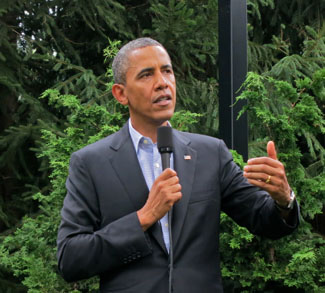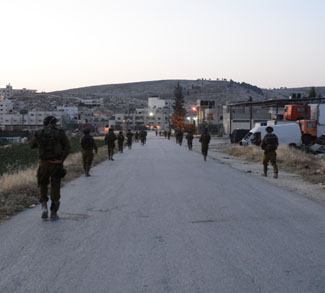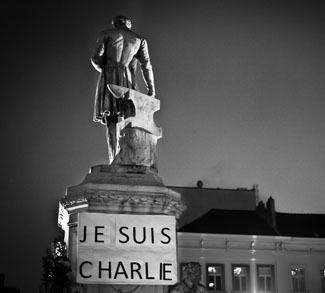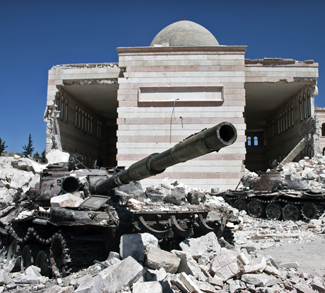On August 21, it was reported that several towns in Syria’s Ghouta region were hit with chemical agents. The UN team responsible for investigating the attacks has since returned to The Hague to compile the results of their findings. It seems certain that chemical weapons were indeed used in Ghouta, but the UN team has no mandate to determine who the perpetrators were.
Claims of chemical weapons in the Syrian civil war are not new. In December and March of last year, both the rebel opposition and the Syrian regime blamed each other for separate attacks involving chemical agents.
The US government claims to have overwhelming evidence incriminating the Syrian regime. Citing a newly declassified intelligence report, Secretary of State John Kerry blamed the Syrian regime for the most recent chemical attacks that purportedly killed 1,429 people. The report also claims that Assad used chemical weapons multiple times against the opposition on a smaller scale. If we assume these allegations to be true (notwithstanding the mound of evidence that remains classified and reliance on questionable sources such as social media), this begs the question: Why is Obama ambivalent on his ‘red line’ commitment?
In search of an answer, a few things have become apparent. First, Obama lacks the decisiveness to order a military strike. His decision to consult Congress was apparently made at the last moment. Since military plans have been so widely publicized, which virtually eliminates the element of surprise, the White House clearly wants Syria and Russia to know of its intentions in order to prevent any confusion and inadvertent escalation that might arise out of uncertainty. But this also tends to limit the effectiveness of a strike, affording the Syrian regime and its allies adequate time to prepare and respond accordingly.
For President Obama, the alternative option – to do nothing and hope for the best outcome– is less appealing and more costly. Obama has calculated that inaction in the face of defiance suggests weakness and also sets a dangerous precedent for the future use of chemical warfare. In a stunning move on August 31, Obama decided that, in spite of his authority to order unilateral military action against Syria, he would appeal to Congress for approval.
Obama’s suggestion that he retains the right to strike even in the event of a “no” vote from Congress is troublesome. Not only does this make him appear as an imperial president, it also conflicts with the intricate balance of constitutional war powers. This is a turnaround from his statement on war powers back in 2007 when he stated, “The president does not have power under the Constitution to unilaterally authorize a military attack in a situation that does not involve stopping an actual or imminent threat to the nation.” Then-Senator Obama was accurate: Current-President Obama may be overstepping his authority.
A few factors explain his decision to consult Congress. David Cameron’s failure to secure approval from the UK parliament to use force against Syria was demoralizing. The British have stood by their American allies in nearly every conflict since World War II, with the exception of Vietnam. Furthermore, absent of any UN mandate to use military force (a mandate that existed in the 2011 Libyan intervention), there is greater pressure for Obama to secure domestic legitimacy for military action. The American people have also adamantly opposed any military strike on Syria. Obtaining congressional approval is an attempt to compensate for the legitimacy deficit elsewhere. It also helps spread political risk so that Congress can share the responsibilities of any post-strike entanglements.
The legality of a military strike is also being challenged. Under the UN Charter, states must refrain from the use of force, except when individual or collective self-defence is involved or when the Security Council authorizes it under Chapter VII of the Charter, none of which apply in the case of Syria. Although the Responsibility to Protect (R2P) doctrine has emerged as a norm of customary international law, it is usually preceded by a unified international coalition, and this has yet to materialize.
Obama is also mindful that Syria receives support from a powerful ally: Russia. President Putin has consistently warned the US against striking his Syrian ally, suggesting that the chemical attacks were a provocation by the rebels to elicit US intervention. In a bid to collect more information about the escalating conflict, Moscow’s Defence Ministry has sent a reconnaissance ship to the Mediterranean where US destroyers are located. But Moscow will not undertake any active military role in Syria because that would mean a military confrontation with Washington, which Moscow lacks both the will and the capability to pursue. Moscow will likely respond by rearming the Assad regime. A US military strike on Syria will further deteriorate US-Russian relations, making any political resolution on Syria in the near future less likely.
Although Washington seeks the fall of Assad, it is not entirely convinced of the Syrian opposition’s post-Assad intentions. Moreover, Syria’s jihadists, who have become increasingly powerful within the opposition, should continue to alarm Washington. For Syrians who continue to support Assad, the choice is between the lesser of two evils: the relatively predictable and secular Assad or an extremist opposition controlling a fragmented Syria. The old narrative of a regime killing its own people is not entirely accurate in today’s Syria. In truth, this is a proxy war with sectarian tensions between two sides who continue to receive foreign support to maintain their killing machines. Both sides have committed atrocities, and to make matters worse, the conflict – no longer contained within Syria’s borders – has wider regional implications.
Obama now finds himself in a precarious position. How does one enforce a ‘red line’ commitment to launch a unilateral strike without any public support or a UN mandate, against a defiant Assad who is firmly backed by a major power rival, when such a strike would doubtlessly create a heightened risk of military escalation? Although a military strike might deter Assad from employing chemical warfare, it will not alter the balance of power in the Syrian civil war, nor will it significantly affect Assad’s conventional fighting ability, as multiple analysts have indicated that the Syrian regime has the capacity to withstand the strikes.
In truth, the real red line for Washington is a major shift in the balance of power in Assad’s favour, whether through the use of chemical weapons or foreign support. Since past incidents of chemical weapons were smaller in scale, they did not significantly break the stalemate. This may explain Obama’s ambiguity about responding militarily following past incidents of chemical attacks. The deployment of Hezbollah guerillas and Iranian Revolutionary Guards – which helped tip the balance in Assad’s favour – coupled with the use of chemical weapons to break through rebel defense lines has been the real worry for Washington. Currently, Assad’s forces have the upper hand.
In the event of a US military strike, the Syrian regime and its allies, notably Iran and Hezbollah, say they are prepared to retaliate. In reality, Damascus has been preparing for a US military strike since 2003 when its Ba’athist rivals in Iraq were toppled. If Washington uses military force for the first time since the conflict began, it must be prepared to face the consequences, including a military entanglement arising out of a potential Syrian retaliation.
Ultimately, Obama has tied his own hands. The pressure to react to the Ghouta attacks is largely based on his own ‘red line’ statement in August 2012. The commitment has left him with few alternative options short of making his administration look weak and indecisive. Ground troops and a no-fly zone have long been eliminated from the equation, meaning limited, precision strikes will not significantly alter the strategic balance of power on the ground. This makes a military strike costly with few benefits. Meanwhile, his administration has yet to make a convincing case that a military strike on Syria furthers US national interests.
For Washington, the best way to secure a favourable outcome in Syria is not through military force but through constructive dialogue with Moscow to bring about a political settlement and stability. Both Washington and Moscow must convince their allies to cease contributing to the deadly cycle of violence in Syria. If both Washington and Moscow are serious about ending the civil war, they must exert pressure on states like Iran and Saudi Arabia to terminate the migration of foreign fighters that have contributed to this regional proxy war. But Washington must not isolate Iran from any peace conference as it has a vital role to play in bringing about stability. For a political settlement to be reached, compromise is needed. Since grounds troops and a no fly zone are off the table, Assad will not be defeated militarily. The rebel opposition must abandon their unrealistic demands of Assad’s resignation as a precondition to peace talks. In turn, Assad must acknowledge that apart from those radical factions seeking an Islamic state, a large demographic of moderate Syrians – not terrorists – legitimately aspire to transform an archaic one-party system run by a family that has been in power for more than 40 years. We should hear less drumbeats of war and more plans for dialogue. Only then can we reasonably expect to see an end to the bloodshed that has claimed more than 100,000 lives, uprooted millions from their homes, and threatened the stability of the region.




